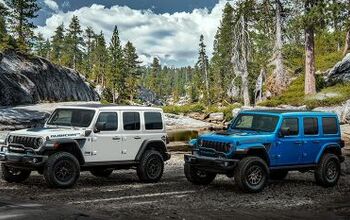Ur-Turn: Transparency In The Car Buying Process. What Is It Really?
This week’s Ur-Turn comes from David Ruggles, a noted industry figure, prolific TTAC commenter and author of the Autos and Economics blog.
In my 44 years in the auto industry there have been a couple of continuing themes I have observed. First, there is never ending change. Second, consumers are uncomfortable with the negotiating process required when buying a vehicle. These days vendors to auto dealers are trying to sell dealers on the concept that “transparency” is the key to success in selling cars.
They demonize “traditional” dealers to sell their wares to those dealers who want to set themselves apart in the transparency war, as if the winners will take the lion’s share of the business. Scott Painter and TrueCar is a prime example. In our industry, there is a discussion taking place about what “transparency” actually is. I contend that true and absolute transparency has a precise definition, brought to us from the world of economics.
True market transparency is when buyers and sellers have the same information and the equal ability to interpret that information. This is called “symmetrical information. This leads to turning the product into a commodity which leads to an “efficient market.” “Efficient markets” lead to “disintermediation,” or the elimination of the middle man.
Yes. I know there are many consumers who think that would be a wonderful thing, as if buying a vehicle direct from the manufacturer could actually work on any kind of scale.
But these vendors have their own definition of transparency, which I find to be highly deceptive. I believe TrueCar and the others are trying to create the “perception of transparency” or “relative transparency,” NOT true transparency. In fact, it’s just another marketing strategy to make money on a car deal, perhaps a good one. But it isn’t “transparent.” It’s also a strategy to get dealers to participate in their own demise. We saw how that ultimately worked out with TrueCar. Dealers woke up and pushed back.
To be clear, I have no problem with dealers making money on car deals. And auto dealers should abide by both the spirit and letter of the law on “legal transparency.” But there is no other retail business I can think of where consumers feel entitled to “symmetrical information.” They couldn’t interpret it the information anyway, but that’s another discussion.
In my world, true transparency is when a consumer asks the F&I manager, “What is your cost on that Service Contract,” the F&I manager answers truthfully. If the consumer asks, “What rate markup are you charging me,” the F&I manager answers truthfully. If the consumer asks the dealer, “What is your net cost on the vehicle you are selling me,” the dealership answers truthfully. A dealer being evasive when asked a direct question like that is justified, but it just isn’t “transparent.” Consumers have the right to ask these questions. Sellers have the right to say, “It’s none of your business.” Hopefully, this is done artfully when necessary.
I think TTAC has a relatively broad cross section of consumers as readers and contributors. My question isn’t about how one thinks things should be. MY question is, “What is the true definition of “transparency.” Mine or Scott Painter’s new definition?
More by Ur-Turn
Latest Car Reviews
Read moreLatest Product Reviews
Read moreRecent Comments
- Jeff When Chevrolet started offering vehicles with features that were exclusive to Cadillac and Buick and Cadillac cheapened their cars to chase volume that was the beginning of the decline of the Cadillac brand. The same thing holds true for Ford and Lincoln. No compelling reason to buy the luxury brand over the lower tiered brand when the lower tiered brand can be comparably equipped for thousands less.
- Lou_BC On a different note, I read that 30% of the world's energy is now generated by "renewable" sources.
- Kjhkjlhkjhkljh kljhjkhjklhkjh not surprised their grid is as terrible as ours ...
- Lou_BC EV's are a convenient foil. Cadillac has been searching for its place. Are are they luxury performance? In your face audacious? Do they offer prestige? What sets them apart from the rest of "the look at me I'm special" vehicle market? I can buy a Denali SUV or pickup with similar luxury.
- Cprescott No big loss. It was always third rate when there was competition. At best its only good point was its price point.


































Comments
Join the conversation
So would you say that the rest of your claims are more honest, less honest, or about the same as trying to pretend that customers actually want dealers to price fix?
> Heck, you can just make stuff up and there’s no accountability. Never thought I'd hear that from a car sales industry rep. What good is knowledge when you can't tell the truth?